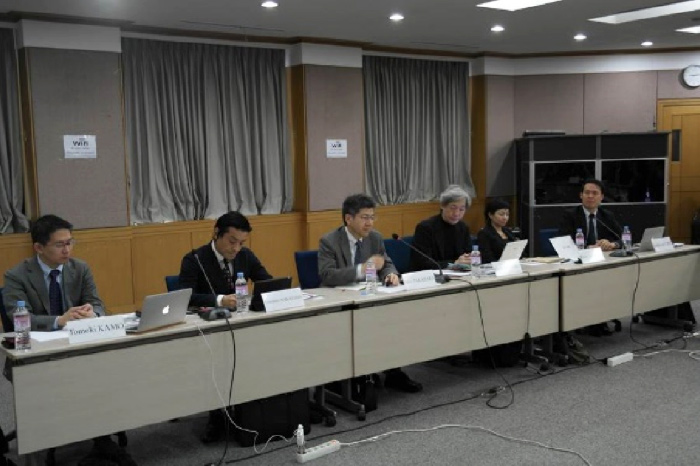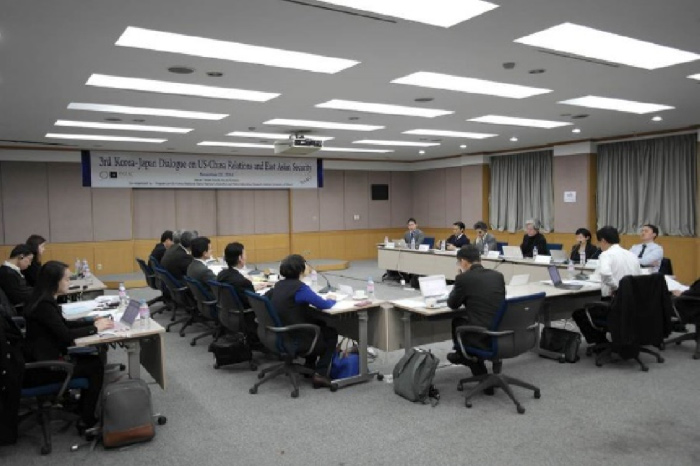3rd Korea-Japan Dialogue on US-China Relations and East Asian Security
| Date: | Saturday, November 22, 2014 |
|---|---|
| Venue: | Rose Room, 1/F, SK Guest House (Hoam Faculty House Complex) Seoul National University |
| Co-organized by: | Program on US-China Relations, Seoul National University Policy Alternative Research Institute, University of Tokyo |
The Security Studies Unit (SSU) and the Policy Alternative Research Institute of the University of Tokyo and Program on US-China Relations of Seoul National University were delighted to co-host the Korea-Japan Dialogue on US-China Relations and East Asian Security held at the Hoam Faculty House Complex in Seoul National University on November 22, 2014. This event was made possible by the generous support of Seoul National University and the Japan Society for the Promotion of Sciences, and saw the participation of prominent scholars of Chinese politics and foreign policy from Korea and Japan.
The dialogue was opened by welcoming remarks from Professor Jaeho Chung who has greeted the Japanese delegation recalling how the first dialogue took place more than a decade ago under the friendship between him and Professor Akio Takahara.
Mr. Sangduk Lee, Director General of Northeast Asia Bureau of Ministry of Foreign Affairs, gave a welcoming speech in which he thanked Seoul National University and University of Tokyo for making the event possible. He recalled when he initially set out to launch the bilateral scholarly talks on China in 2011, emphasizing the importance of continuing the event regardless of ups and downs in the political relations between Korea and Japan.
Session 1: Domestic Politics How to make out Xi Jinping’s China
The session was chaired by Ambassador Jung Seung Shin, who introduced Dr. Jaehwan Lim, associate professor in international relations at Aoyama Gakuin University (Tokyo), as the first speaker, to be followed by Professor Sung Heung Chun in political science at Sugang University (Seoul).
Dr. Lim addressed the question of what has enabled and prompted Xi’s power consolidation. As a key to making sense of the two years under Xi’s rule, Dr. Lim stressed the role of institutions that particularly have shaped the process of elite turnover and power succession. Countering the widely held view that Xi’s power stems from factional dynamics, Dr. Lim argued that Xi has been able to consolidate his power and take bold policy initiatives within a relatively short period of time, precisely because he bases his power on institutional arrangements that made it possible for him to legitimize power concentration and resolve commitment problem in the top leadership. Dr Lim also noted the significance of Xi’s grip on the military in that Xi has emphasized PLA’s combat readiness and effectiveness.
Professor Chun started his remarks by pointing out that there is a heated debate about the meaning of Xi’s power concentration, which some commentators even describe as the advent of “emperor Xi.” However, despite such new initiative as anti-graft campaign at all administrative levels, Professor Chun mentioned that it would be somewhat far-fetched to say that the pre-existing collective leadership system now faces a serious challenge, because Xi does not seem to be behaving against the collective will of the top leaders. In this connection, Professor Chun emphasized the need to explore the possible developments and implications of “socialist law-based governance” newly articulated at the fourth plenum in October 2014.

Session 2: Views on US-China Relations
The session was moderated by Professor Akio Takahara at the University of Tokyo, who introduced the speakers of the session, Dr. Wooseon Choi from Korean National Diplomatic Academy (Seoul) and professor Toshihiro Nakayama who teaches American politics at Keio University (Tokyo).
Dr. Choi delivered a speech about US “rebalancing” to Asia and China’s response. He pointed out that Washington’s renewed commitment to Asia is comprehensive but focused on rebalancing against China’s growing military power, which is apparent in redeployments of naval forces, development of the Air-Sea Battle concept, and recent attempts to strengthen alliance network in the Asia-Pacific region. With regards to China’s reaction, Dr. Choi claimed that China is still maintaining its cautious strategy focused on economic development, showing no intention to directly challenge the US power. However, China is increasing its efforts for long-term balancing by pushing forward military modernization and enhancing regional influence using economic leverage. If the two countries stick to the current policy position, Dr. Choi predicted, US-China relations will mainly be cooperative for at least 10 years despite the inevitably increasing competition in the long run.
Professor Nakayama concentrated his presentation on the discussion about how to situate China policy in the overall foreign policy posture of the Obama administration. While characterizing Obama’s basic approach to foreign affairs as a “re-set diplomacy,” Professor Nakayama stated that the emphasis on Asia-Pacific region has been existing since the onset of the administration, which subsequently led to the formation of “Pivot” or “Rebalancing” policy. Among the factors shaping US rebalancing to Asia are solidifying alliance network, establishing stable, productive, and constructive relationship with China, and empowering regional institutional arrangements including new multilateral economic frameworks. However, according to Professor Nakayama, the domestic and regional circumstances under which rebalancing is being pursued is not very favorable, and the existence of conflicting policy agendas underscores the difficulty.

Session 3: Assessing Japan-China Relations and Korea-China Relations
The final session was chaired by Professor Jaeho Chung at Seoul National University, who introduced as speakers Dr. Tomoki Kamo who teaches Chinese politics at Keio University and Dr. Myeonghae Choi, a senior fellow at Samsung Economic Research Institute.
Dr. Tomoki Kamo delivered a presentation that mainly focused on how to evaluate and explain the realization of the Abe-Xi meeting in November 2014, with a special interest in what motivated Xi to agree to the terms of the meeting. Despite divergent official interpretations of the “four-point agreement,” Dr. Kamo pointed out that the agreement (“principled consensus” in Chinese translation) should be considered as an initial step to respond to changes in distribution of power and subsequent transformations in the regional order. In terms of Xi’s intention of meeting with Abe, Dr. Kamo raised a possibility that Xi’s power consolidation within the party leadership would have provided him with a degree of discretion in dealing with sensitive foreign policy problem as territorial disputes with Japan.
Dr. Choi Myunghae made a presentation titled “structural issues in Korea-China relations” in which he analyzed the recent developments of Korea-China relations. Prior to explaining specific issues, Dr. Choi pointed out that contrary to bilateral economic relations that have consistently grown both in quantity and quality since the diplomatic normalization in 1992, political relations has been, in fact, replete with major ups and downs. Among political issues between China and Korea is the adjustment of US-Korea alliance to a new security environment, as is evident in the debate over the introduction of THADD system. The North Korea problem also represents a major and possibly thorny political issue, as there seems to be no consensus in South Korea concerning the role of China in dealing with problems related to North Korea such as nuclear program and economic cooperation. Finally, on the recent talks about the so-called “China-ROK rapprochement,” Dr Choi suggested that Beijing’s perceptions toward the international role and status of ROK have changed so much that Chinese leaders now see the latter as an object of “strategic co-optation” which led to the recent “new” development of the bilateral relationship.

